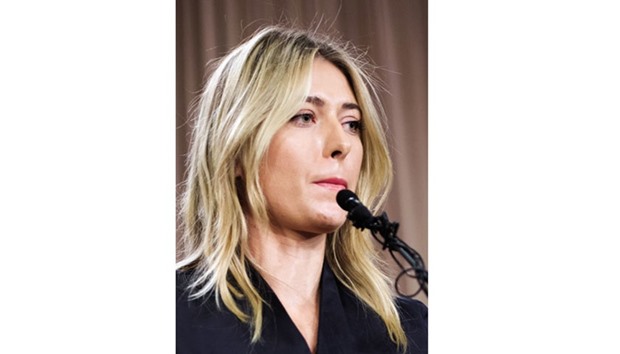Racket firm Head has extended its contract with five-times grand slam champion Maria Sharapova despite her failed drugs test at this year’s Australian Open, CEO Johan Eliasch said yesterday.
The 28-year-old Russian will be provisionally suspended by the International Tennis Federation (ITF)
from this weekend after she admitted at a news conference on Monday
taking the banned substance meldonium.
Swiss watchmaker TAG Heuer cut ties with Sharapova this week, while Nike and Porsche have distanced themselves from her.
However, Eliasch said Sharapova, under contract with Head since 2011, had ‘earned the benefit of the doubt’ after making an ‘honest’ mistake.
“For a decade Maria Sharapova has been a role model and woman of integrity who has inspired millions of fans around the world to play and watch tennis,” he said in a statement.
“The honesty and courage she displayed in announcing and acknowledging her mistake was admirable. HEAD is proud to stand behind Maria, now and into the future and we intend to extend her contract.
“We look forward to working with her and to announcing new sponsorships in the weeks and months ahead.”
A statement issued later confirmed that the contract had been signed and extended.
In Los Angeles on Monday, Sharapova said she had been taking meldonium, also known as mildronate, for 10 years because of health problems and regular bouts of flu.
The drug, produced in Latvia but unavailable for purchase in the United States where Sharapova is based, was only added to the World Anti-Doping Agency (WADA) list of banned substances in January, shortly before her positive test in Melbourne.
Manufactured for people suffering from heart problems, it can also increase blood flow and improve exercise capacity.
Head said they were convinced Sharapova had not taken the drug to gain any competitive advantage.
“It is common ground within the scientific community that in order for meldonium to have any relevant performance enhancing effect it has to be taken in daily dosages in excess of 1,000 to 2,000mg,” the statement said.
“According to the attorney for Maria, her dosage was significantly less than that.”
While underlining Head’s commitment to clean sport, Eliasch said he trusted Sharapova’s explanation that she had not realised meldonium had been banned by WADA.
“In the absence of any evidence of any intent by Maria of enhancing her performance or trying to gain an unfair advantage through the use of mildronate, we further conclude this falls into the category of ‘honest’ mistakes,” he said.
Russian biathlete Eduard Latypov was suspended from competition on Thursday after testing positive for meldonium , the latest in a flurry of athletes to fall foul of the drug since it was prohibited.
Sharapova thanks her fans for support and loyalty
Days after stunning the sports world by announcing she had failed a drug test at the Australian Open in January, Maria Sharapova thanked her fans for their “wonderful words” that put a smile on her face. The Russian faces a ban of up to four years pending an investigation by the International Tennis Federation after testing positive for meldonium, which some researchers have linked to increased athletic performance and endurance.
“I woke up yesterday morning with an inbox, in full capacity of love and compassion,” five-times grand slam champion Sharapova, 28, posted on Facebook. “In this moment, I am so proud to call you my fans.
“Within hours of my announcement, you showed me support and loyalty, which I could only expect to hear when someone would be at the top of their profession. I wanted to let you know that your wonderful words put a smile on my face.
“I’d like to play again and hope to have the chance to do so. Your messages give me great encouragement. This message isn’t anything else but to say thank you. Thank you very much.”
Sharapova, who has struggled with multiple injuries in recent years but is known for her never-say-die approach to the game, said she was prepared to battle through her latest setback.
“New day, new start,” the former world number one wrote on Facebook. “It is fair to say that this day was not average.
“Nothing came to mind at 6am, except that I am determined to play tennis again and I hope I will have the chance to do so. I wish I didn’t have to go through this, but I do - and I will.
“I needed to sweat, to push through and grind as I have done most of my life, so I made my way to the gym. That’s when I realised a bunch of tinted windowed cars were following me. The good old paparazzi, back on the trail.”
Sharapova, the world’s highest-earning sportswoman, has accepted full responsibility for her mistake in taking a drug that has been outlawed since Jan. 1, having previously used it on the advice of her family doctor for a decade.
The International Tennis Federation’s anti-doping programme calls for a four-year suspension for a positive test. That ban can be reduced in various circumstances, such as if the player shows no significant fault or negligence.

Maria Sharapova
